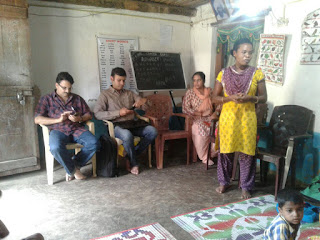Few years ago a writer 'Grace Pundyk' from Australia gifted me her work 'Honey Trail'.A book which narrates her travel across globe explaining history of honey from times of Egyptian civilization to the modern story of retail honey market. I started to relate to the contents of her book when i started my trip to Chattisgarh. A tribal state with 80% of forest cover and mostly Mahua trees.Tribal communities at chattisgarh make traditional 'Mahua wine' from fallen flowers.Along with a friend Ram narendra who runs an NGO 'Pragati prayas sanstha' at Dantewada,Chattisgarh, i had an opportunity to travel one of the deep and interior areas of chattisgarh. I met many tribal youth, government authorities who are putting lot of effort to skill rural communities regarding many aspects including organic farming,tailoring,horticulture and non-violent rock bee honey collection.An interactive time with tribal youth regarding 'Transfer of native Cerana bee colonies to the beehive box' was an eyeopener to the tribal community. I played a video and explained the steps involved in it since rains are pouring in this season.
Though Cerana bees have high absconding nature, it is important to practice with native species so that no ecological imbalance takes place. Skilling tribal communities about 'Hiving'(Transfer colony from natural habitat to the beehive box) will bring in sustainability in the tribal beekeeping model since they can always start by hiving native bees when honey flow starts. Chattisgarh's agricultural practices consumes less pesticides when compared to other farming states which makes more conducive space for beekeeping activity.
All communities and government departments of Chattisgarh are working hard to bring in peace and prosperity through various means. Skill development and creation of opportunities will change the course of the state for sure. All the sacred beliefs,ecology and tribal way of life will be holistically preserved if activities like beekeeping can be introduced in these areas.Finally, beekeeping should reach right places!
Though Cerana bees have high absconding nature, it is important to practice with native species so that no ecological imbalance takes place. Skilling tribal communities about 'Hiving'(Transfer colony from natural habitat to the beehive box) will bring in sustainability in the tribal beekeeping model since they can always start by hiving native bees when honey flow starts. Chattisgarh's agricultural practices consumes less pesticides when compared to other farming states which makes more conducive space for beekeeping activity.
All communities and government departments of Chattisgarh are working hard to bring in peace and prosperity through various means. Skill development and creation of opportunities will change the course of the state for sure. All the sacred beliefs,ecology and tribal way of life will be holistically preserved if activities like beekeeping can be introduced in these areas.Finally, beekeeping should reach right places!
On my Honey trail
Beekeeping orientation at Chote tumnar,Dantewada
Found tribal women selling bamboo shoots on the way to Bijapur
Talking to Rock bee honey hunters of Dantewada
Talking to a tribal leader about starting beekeeping at their village
Nerli,dantewada
Stingless bee colony - Someone had opened up to take honey



















































